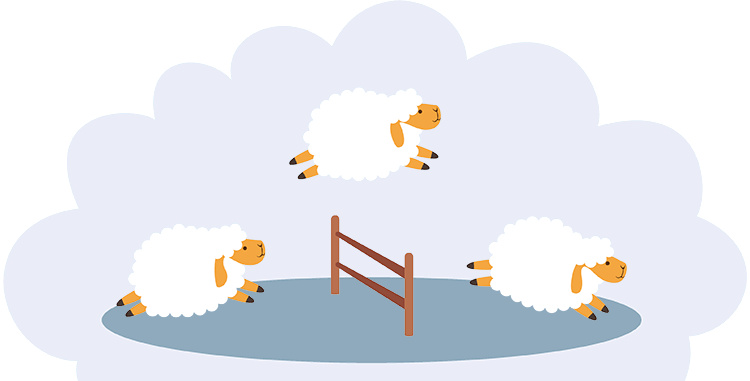Why does a child snore in his sleep?
Approximately 10-14% of children aged 2-6 years snore during sleep. Is this a norm or a pathology? Why can a child snore?
The mechanism of children’s snoring. Uncomplicated and complicated snoring
At the moment of inhalation, air enters the mouth or nose, goes through the pharynx to the larynx, then to the trachea and further through the bronchi to the alveoli, where gas exchange occurs. If there are no obstacles in the way of the air stream, breathing is silent. Snoring occurs when the lumen of the pharynx narrows, and its walls begin to touch, and even bump against each other when breathing. It is the vibration and beating of soft tissues that give the effect of snoring.
If you notice that your child snores during sleep, know that this is not normal. In uncomplicated snoring, air enters the respiratory tract with each breath, so the supply of oxygen to the lungs is not disturbed. But 1-2% of children develop complicated forms of snoring . Such children snore in their sleep, moreover, they periodically experience respiratory arrests lasting 10 seconds or more. This condition is a disease and is called obstructive sleep apnea syndrome , abbreviated OSAS.
It would be very significant to recall one clinical example. A few years ago , a woman contacted us , whose child could not be diagnosed with apnea syndrome and prescribed treatment for a long time … You can read more about this in a letter of thanks , which she wrote after successfully solving the problem.
about snoring and obstructive sleep apnea in adults here.
Children’s snoring: is it dangerous?
Only a doctor can determine the sleep apnea syndrome during a special polysomnographic examination . If a child snores in his sleep, and at the same time he has obvious nocturnal breathing stops, the situation is definitely serious. The brain and all the internal organs of the sleeping person experience oxygen starvation. If the problem is ignored, the patient worsens night sleep and general well-being throughout the day. Very often, these children develop attention deficit hyperactivity disorder, they do poorly at school, and lag behind their peers in physical development .
Causes of snoring in children
The most common cause of snoring in a child is an increase in the pharyngeal (adenoids) or palatine tonsils (usually this occurs with chronic tonsillitis). The overgrown lymphoid tissue creates a mechanical obstacle to the air flow. At night, when the muscles of the pharynx relax for natural reasons, its lumen narrows so much that snoring and even breathing stops occur. If the reason lies in the enlargement of the tonsils, then, as a rule, the child snores after a cold, when he still has an inflammatory swelling of the pharynx.
The second most common reason why children snore in their sleep is childhood obesity. With excess weight, adipose tissue is deposited not only in the subcutaneous fat, but also in the soft tissues of the pharynx. As a result, its lumen narrows, and snoring occurs.
The third reason for snoring in children is the peculiarities of the anatomical structure of the bones of the skull. A child with a small, backward-sloping lower jaw snores much more often than children with a normal facial structure. This feature can be genetically determined, or it can be the result of a long-term violation of nasal breathing.
If a child aged 2-10 years has difficulty breathing through the nose, and he breathes through his mouth, then he gradually develops a “bird’s face”: narrow, with no pronounced cheekbones, a strongly protruding nose with a hump, crowded teeth and a small lower jaw. Such changes in the structure of the skeleton develop secondarily, but pose a threat of not only snoring, but also OSA. This is due to the fact that in people with a “bird’s face” there is a steady narrowing of the airways at the level of the pharynx.
Snoring associated with a cold
The appearance of snoring during acute respiratory infections is a common situation. With a runny nose, the nasal mucosa swells, swells – nasal breathing worsens, which in itself can provoke snoring. In addition, there is a natural reaction of the body to respiratory infections – activation of the lymphatic system, which can manifest itself in an increase (hypertrophy) of the palatine or pharyngeal tonsils. Hypertrophy of the tonsils, especially against the background of already existing adenoids, additionally provokes snoring in case of illness.
If a child snores after a runny nose, this may indicate the formation of adenoids or chronic tonsillitis in him. Parents should take the baby to an ENT doctor .
Snoring in newborns
Children of the first days of life can also snore, but this is most often the norm. The reason for snoring is the narrowness of the nasal passages. In this situation, parents can be advised to carefully clean the crusts from the child’s nose using cotton flagella. This will make it easier for him to breathe. If the child is already 1-2 months old, and he continues to snore, you should definitely visit a doctor to determine the cause of this condition.
Unfortunately, an ENT doctor does not always have the necessary equipment to diagnose snoring and OSA. If the implementation of his recommendations did not resolve the issue of why the child snores in his sleep, the surest step would be to contact a specialized sleep center in your city for a consultation.
The center employs qualified somnologists who will conduct the necessary examination and establish why the child is snoring. Depending on the causes of the condition, a treatment will be carried out that will save the little patient from snoring and all the problems associated with it.
It will be interesting for specialists to watch the following video about the causes and mechanism of development of apnea in patients of different ages.

